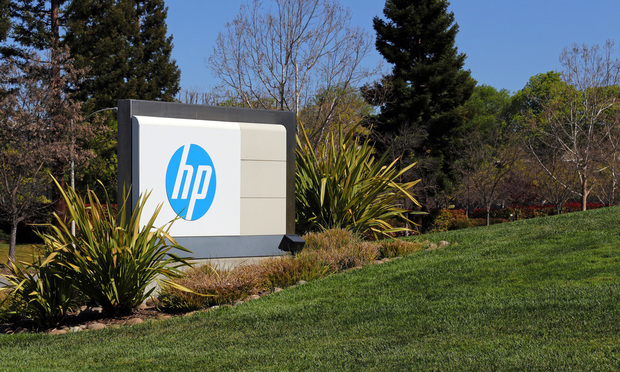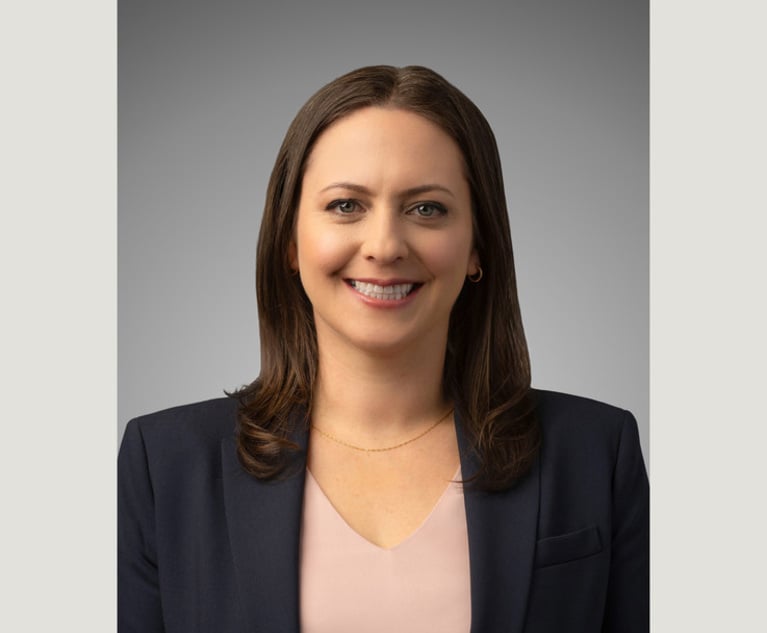High Court Seeks SG Views on Hot-Button Patent Issue
The question in HP v. Berkheimer is whether patent eligibility is always a matter of law that can be resolved at an early, less costly stage of litigation.
January 07, 2019 at 07:59 PM
4 minute read
 HP World Headquarters.
HP World Headquarters.
The U.S. Supreme Court is dipping a toe back into the issue of patent eligibility.
Five years after a series of decisions strengthening Section 101 of the Patent Act, the high court asked the solicitor general for its views on HP v. Berkheimer. The case concerns when and how often courts can determine eligibility on the pleadings, before litigants face big discovery expenses.
The tech industry has been clamoring for high court review, saying the court's 2014 Alice decision opened the door for early, painless resolution of meritless patent infringement suits, and that Berkheimer is closing it again.
Patent owners consider the Alice test opaque at best and intellectually dishonest at worst. The U.S. Patent and Trademark Office issued new guidance to patent examiners Friday that attempts to clarify how Alice and the cases interpreting it should be applied, and two senators recently convened a meeting of industry and bar association leaders to lay the groundwork for a legislative solution.
“We see the CVSG as a small but encouraging sign. And a good chance to learn what this SG thinks about patent-eligibility,” said Alex Moss, a staff attorney at the Electronic Frontier Foundation who penned an amicus brief supporting certiorari.
Other patent lawyers said the call for the views of the solicitor general could indicate that a few justices are interested in taking the case but others are on the fence. The court could be looking to the solicitor general for a reality check on how often the Berkheimer decision actually comes into play in litigation and how much impact it's having on innovation and the tech economy.
The justices in Alice instructed courts to determine whether a patent claims abstract ideas, laws of nature or natural phenomena. If the answer is yes, and the claims can be implemented using well-understood, routine and conventional tools, then they lack an “inventive concept” and are ineligible for patent protection.
Though often criticized as an “I know it when I see it” test, Alice led to a sea change in district court patent litigation. Judges have frequently used the test to eliminate dubious patent claims on the pleadings or summary judgment. That cut down litigation costs, which in turn removed much of patent owners' settlement leverage.
But Federal Circuit Judge Kimberly Moore's opinion in Berkheimer held that some subset of those cases should not be decided by judges as a matter of law. “Whether something is well-understood, routine, and conventional to a skilled artisan at the time of the patent is a factual determination,” she wrote in Berkheimer. And, sometimes, fact issues require trials to resolve.
When the court denied en banc review, Judge Jimmie Reyna warned that “the consequences of this decision are staggering and wholly unmoored from our precedent.” Judge Alan Lourie wrote that, while he thought Moore had it right, “Section 101 issues certainly require attention beyond the power of this court.”
Four other Federal Circuit judges stood by Moore's decision, suggesting plenty of cases can still be resolved at an early stage.
That didn't mollify HP, which is represented before the Supreme Court by Morgan, Lewis & Bockius and Gibson Dunn & Crutcher. They note that in Alice, the Supreme Court stated that “we determine whether the claims at issue are directed to [a] patent ineligible concep[t]”—meaning courts should decide eligibility as a matter of law.
“There is an urgent need for this court's review,” Moss wrote amici EFF and the R Street Institute. Under Berkheimer, “district courts have consistently delayed patent eligibility rulings, reversing the trend toward early resolution.”
Inventor Steven Berkheimer is represented by Jenner & Block and Skiermont Derby. “The selection of a pronoun is not a holding,” Jenner's Adam Unikowsky wrote in opposing cert.
Some court watchers have said in recent years that the justices feel they've said enough on Section 101 and aren't interested in wading back in. But two new justices have joined the court in the last year, and one of them—Neil Gorsuch—is already showing keen interest in patent issues.
This content has been archived. It is available through our partners, LexisNexis® and Bloomberg Law.
To view this content, please continue to their sites.
Not a Lexis Subscriber?
Subscribe Now
Not a Bloomberg Law Subscriber?
Subscribe Now
NOT FOR REPRINT
© 2025 ALM Global, LLC, All Rights Reserved. Request academic re-use from www.copyright.com. All other uses, submit a request to [email protected]. For more information visit Asset & Logo Licensing.
You Might Like
View All
Weil Lures DOJ Antitrust Lawyer, As Government Lateral Moves Pick Up Before Inauguration Day
5 minute read
Supreme Court Wrestles With Disabled Ex-Firefighter's Discrimination Case

SEC Ordered to Explain ‘How and When the Federal Securities Laws Apply to Digital Assets’
5 minute read
Kirkland, Cleary, King & Spalding Among the Latest to Add DC Laterals
3 minute readTrending Stories
Who Got The Work
J. Brugh Lower of Gibbons has entered an appearance for industrial equipment supplier Devco Corporation in a pending trademark infringement lawsuit. The suit, accusing the defendant of selling knock-off Graco products, was filed Dec. 18 in New Jersey District Court by Rivkin Radler on behalf of Graco Inc. and Graco Minnesota. The case, assigned to U.S. District Judge Zahid N. Quraishi, is 3:24-cv-11294, Graco Inc. et al v. Devco Corporation.
Who Got The Work
Rebecca Maller-Stein and Kent A. Yalowitz of Arnold & Porter Kaye Scholer have entered their appearances for Hanaco Venture Capital and its executives, Lior Prosor and David Frankel, in a pending securities lawsuit. The action, filed on Dec. 24 in New York Southern District Court by Zell, Aron & Co. on behalf of Goldeneye Advisors, accuses the defendants of negligently and fraudulently managing the plaintiff's $1 million investment. The case, assigned to U.S. District Judge Vernon S. Broderick, is 1:24-cv-09918, Goldeneye Advisors, LLC v. Hanaco Venture Capital, Ltd. et al.
Who Got The Work
Attorneys from A&O Shearman has stepped in as defense counsel for Toronto-Dominion Bank and other defendants in a pending securities class action. The suit, filed Dec. 11 in New York Southern District Court by Bleichmar Fonti & Auld, accuses the defendants of concealing the bank's 'pervasive' deficiencies in regards to its compliance with the Bank Secrecy Act and the quality of its anti-money laundering controls. The case, assigned to U.S. District Judge Arun Subramanian, is 1:24-cv-09445, Gonzalez v. The Toronto-Dominion Bank et al.
Who Got The Work
Crown Castle International, a Pennsylvania company providing shared communications infrastructure, has turned to Luke D. Wolf of Gordon Rees Scully Mansukhani to fend off a pending breach-of-contract lawsuit. The court action, filed Nov. 25 in Michigan Eastern District Court by Hooper Hathaway PC on behalf of The Town Residences LLC, accuses Crown Castle of failing to transfer approximately $30,000 in utility payments from T-Mobile in breach of a roof-top lease and assignment agreement. The case, assigned to U.S. District Judge Susan K. Declercq, is 2:24-cv-13131, The Town Residences LLC v. T-Mobile US, Inc. et al.
Who Got The Work
Wilfred P. Coronato and Daniel M. Schwartz of McCarter & English have stepped in as defense counsel to Electrolux Home Products Inc. in a pending product liability lawsuit. The court action, filed Nov. 26 in New York Eastern District Court by Poulos Lopiccolo PC and Nagel Rice LLP on behalf of David Stern, alleges that the defendant's refrigerators’ drawers and shelving repeatedly break and fall apart within months after purchase. The case, assigned to U.S. District Judge Joan M. Azrack, is 2:24-cv-08204, Stern v. Electrolux Home Products, Inc.
Featured Firms
Law Offices of Gary Martin Hays & Associates, P.C.
(470) 294-1674
Law Offices of Mark E. Salomone
(857) 444-6468
Smith & Hassler
(713) 739-1250










